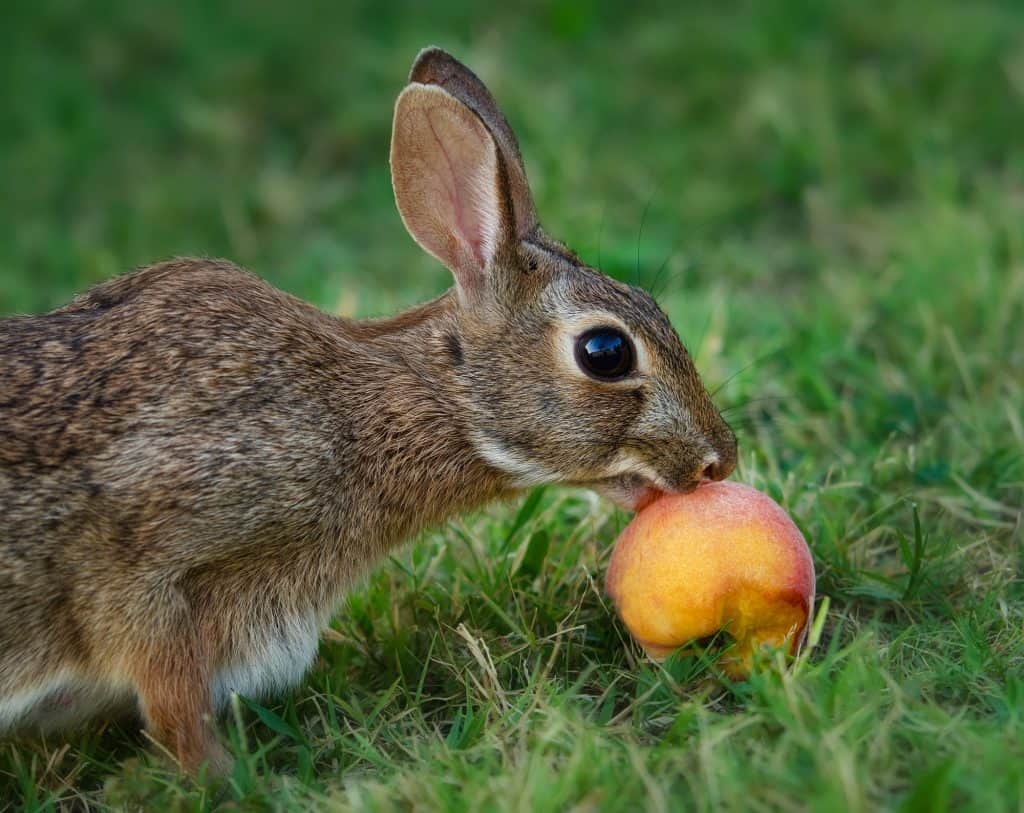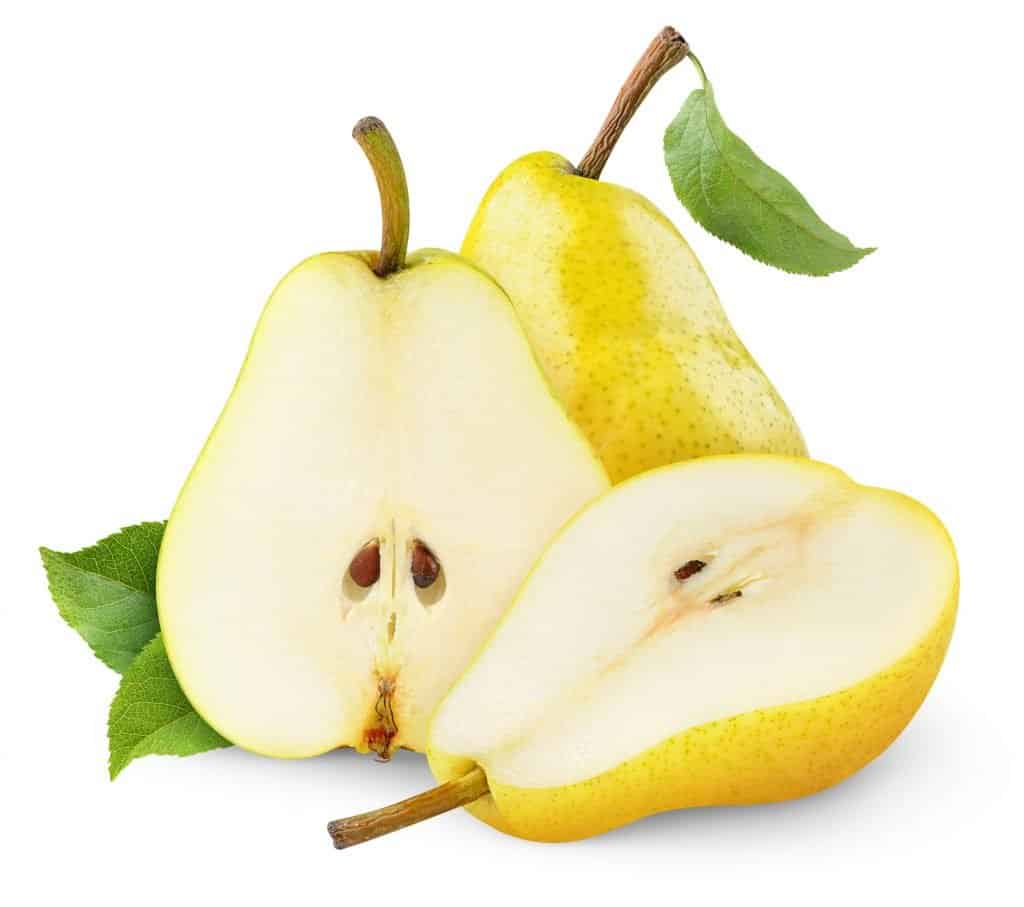As a rabbit owner, you should be concerned with feeding your bunny a balanced healthy diet. We all know that fruit is good for humans to consume but is fruit also good for rabbits? Can rabbits eat pears?
This article will discuss whether rabbits can eat pears, how often they can eat pears and the risks of feeding pears.
Can Rabbits Eat Pears?
Pears are safe for rabbits to eat in moderation. Their diet should predominantly consist of hay and grass but they can have a small portion of pears once or twice a week as a treat. Rabbits can also eat the twig and the skin of the pear if washed to remove any pesticides.
Allowing your rabbit to have a small amount of pear or other fruits like apples, blackberries, and dragon fruit every now and then is acceptable.

Knowing the nutritional value of the foods you are feeding your rabbit ensures that your rabbit is only eating what they can comfortably digest without contributing to obesity or gut problems.
What Are Pears?
Pears are a sweet, mild, bell-shaped fruit with a fibrous center. They are grown on a tree in many countries worldwide and are ready for harvest in late summer each year.
There are around 3000 varieties of pears, which vary in taste and shape. Pears ripen at room temperature and are often picked from the tree before they are fully ripe and stored until they are ready to eat.
Pears are full of nutrients, minerals, and fiber, which is a healthy treat for your rabbit.
Nutritional Information Of Pears
A raw, ripe, medium-sized pear consists of the following nutrients and minerals:
- 84% water
- 15% carbohydrates
- Protein
- Fat
- Fiber
- Antioxidants
- Vitamins C, K, B2, and B6.
- Iron
- Calcium
- Magnesium
- Potassium
A portion weighing 3 ½ oz (100 grams) supplies 239 kilojoules and 57 calories of food energy.
Benefits To Feeding Pears To Rabbits
Pears have a good amount of vitamins and minerals that are beneficial to rabbits.
Pears contain Vitamin K, potassium, Vitamin C, and iron. Rabbits need Vitamin K to help with blood clotting, potassium for their nerves, and iron to prevent anemia.
Vitamin C is not normally needed by rabbits because they produce their own, but a little extra Vitamin C won’t hurt them as long as they don’t consume too much.
Potential Hazards Of Feeding Pears To Rabbits
Although pears are an excellent, healthy, nutritious fruit, they do contain a high amount of sugar which could cause health issues if your rabbit eats too much of it.
An ideal portion of pear is 2 to 3 teaspoons per every 2 pounds (900 grams) of body weight.
Rabbits are herbivores (animals that eat plants). A rabbit’s digestive system is not capable of processing too much sugar; therefore, sugary foods can harm their digestive systems and cause an imbalance of bacteria and fungi in their gut.
Foods high in sugar can also lead to obesity in rabbits, which could cause them could develop skin problems, heart disease, and cancer.
By limiting their intake of sugary foods and overseeing their diet, you should be able to avoid stomach upset while maintaining their ideal weight and keeping their skin and fur healthy.
Never introduce fresh pears or any types of fresh fruit and vegetables into the diets of baby or juvenile rabbits until they are at least three months old. Stick to feeding them hay and pellets and slowly introduce fruit and vegetables into their diets, watching them closely for side effects.
If you have bought a new adult rabbit into your family, introduce new foods slowly unless you are sure that the rabbit is already used to eating fresh fruit.
What Type Of Pears Can A Rabbit Eat?
Fresh pears are the best type of pears to feed any rabbit. Rabbits can also eat the pear skin, the twig, and the leaves.
Many pears are farmed commercially, they could be covered in chemicals and pesticides, so always make sure that you give the fruit, twigs, and leaves a good clean with fresh water before feeding them to your rabbits.
Rabbits can consume dried fruit but it shouldn’t be a regular part of any rabbit’s diet. If dried pear is given to a rabbit they should only be given a tiny portion because dried fruit is high in sugar.
Which Pears Can’t A Rabbit Eat?
Humans enjoy the taste of sweet canned pears, but never, ever, feed them to your rabbit!
Canned pears contain an extremely high amount of sugar, even more so than fresh fruit pieces.
We know that too much sugar can harm your rabbit’s gut, but did you know that the cooking process when canning peaches destroys the fiber in the fruit?
As a result, this vital nutrient is stripped from the healthy treat, making it doubly worthless to your rabbit.
Which Ingredients In Pears Are Harmful To Rabbits?
Never feed pear seeds to your rabbits! They are highly toxic as they contain cyanide which can be fatal to a rabbit.
Seeds are also a choking hazard, so remove any seeds before feeding pear to your bunny.
Other Fruits That Rabbits Can Eat
Pears are all-around healthy fruits for rabbits to eat, as long as they don’t eat the seeds or the canned variety!
You could introduce the following fruits into your rabbit’s diet as a healthy snack, occasionally, to supplement their nutrient and mineral intake.
- Apples, fruit, and skins (never the seeds, they are toxic and contain cyanide!)
- Bananas (high in potassium)
- Blackberries, fruit, and leaves
- Cherries (not the seeds or the plant as they both contain cyanide)
- Grapes, all varieties
- Mango
- Nectarines
- Papaya
- Plums
- Raspberries, fruit, and leaves
- Strawberries, fruit, and leaves
- Tomatoes (not the leaves)
Conclusion
Rabbits can eat pears in moderation, but limit their portion to two tablespoons once or twice a week. When introducing a new food into your rabbit’s diet, do so slowly and monitor your bunny for any adverse reactions for a few days.
If you do notice any side effects, stop feeding the new food immediately and consult your veterinarian.

